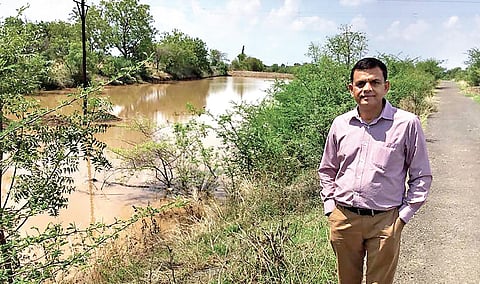

JHARKHAND: Nothing could have changed Ara and Keram villages under Ormanjhi Block, located about 45 km from Jharkhand capital Ranchi.
The people sold forest wood, did menial works and drank the local spirit.
The result was only natural: The two villages were economically and socially most backward in the state. That was three years back.
Today, the villages are self-reliant, and there are opportunities in a variety of works — dairy, poultry and goat farming.
Many have their own shops, and beauty parlours have sprouted. The transformation led Prime Minister Narendra Modi to mention the villages in his ‘Mann ki Baat.’
Ask any villager of the 110 households what brought it all about, s/he would tell you about Siddharth Tripathi, IFS, posted as Commissioner (MGNREGA).
Tripathy arrived in these villages three years back to do some “experiment” for which the villagers were just not ready. He kept visiting the place and finally succeeded in persuading them.
“You don’t need much money to develop a village. What you need is investing your time… you need to unite and organise villagers and educate the people, while giving due respect to their traditional knowledge and skills,” says Tripathi.
The challenge in Ara-Keram, both for the officer and the people, was apparently simple: they had to strengthen the Gram Sabha and shun alcoholism so that they could save money.
In just three years, the average income of the villages has gone up more than five times, records show. And none of the villagers goes to the state capital to work as a labourer as the villages provide him the opportunity to earn.
“Shramdaan (voluntary participation in development works) has played a key role in uniting the Gram Sabha,” says Gram Pradhan of Ara village Gopal Bedia.
So far, the villages have done ‘shramdaan’ worth over Rs 32 lakh, he said.
“Tripathi sir told us to also organise ‘Van Raksha Bandhan’ (tying a sacred thread to trees, vowing to protect them). He motivated us to shun tobacco and alcohol and persuaded the villagers to put their money to better use,” said the Gram Pradhan.
“There was no looking back after that.” Ara and Keram villagers did wonders through ‘Loose Boulder Structure’ (LBS), an indigenous method to conserve water. Boulders were arranged in a pattern to harness the flow of water from the mountains, allowing it to pass through the boulders towards the agricultural fields.
“This required ‘shramdaan’ of 180 villagers’ non-stop for 75 days during which 700 LBS check-dams worth Rs 1.75 crore were built,” said Gram Pradhan of Keram village Rameshwar Bedia.
This resulted in stopping soil erosion, and also facilitated recharging the water- table in the agricultural fields, he said.
Tripathi, who is a great admirer of freedom fighter Anna Hazare, believes that villagers in Jharkhand will have to help themselves by giving up tobacco and liquor so that they are able to earn twice as much.
“I started it in 2006-07 when I was posted as the DFO in Koderma, where similar changes took place”. Tripathi has developed what he calls the ‘Doctrine of Prime Movers’ to transform a village. More than 65 villages in Khunti are on the way to becoming Ara-Keram.
Power of donation
Through ‘shramdaan’ by 180 villagers’ in Ara and Keram nonstop for 75 days, 700 LBS checkdams
worth Rs 1.75 crore were built.
This resulted in stopping soil erosion, and also facilitated recharging the water-table in the agricultural fields.